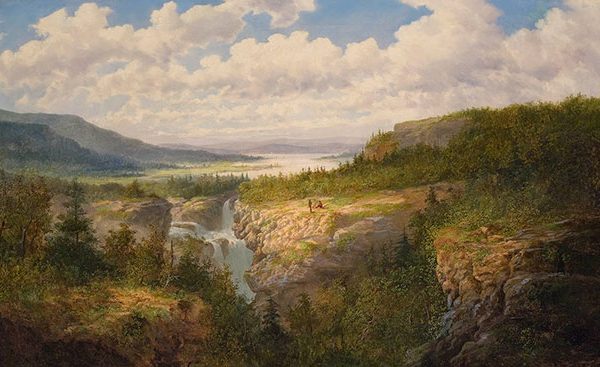I’ve always been fascinated by those tricky slogans politicians and social activists use to dupe the public. These cleverly crafted catchphrases are short, simple, easily understood and tend to stick with people. A currently popular catchphrase is “The wrong side of history” which has been defined as: “Having policies or practices that are perceived as not progressive or enlightened; behaving in a manner that reflects out-of-date or disapproved opinions.”
An example of a slogan from the past: “Don’t change horses in the middle of a stream.” This was part of President Lincoln’s campaign for reelection in 1864. Although the eleven Southern states were not permitted to vote, Lincoln was apprehensive about the 25 states that could take part in the election. Northerners were disappointed with Lincoln’s handling of the War Between The States. They had expected that the Union, with its larger armed force and industrial capacities, would quickly defeat the smaller armed force of the agricultural South. Still the conflict was in its fourth year and the Union had suffered losses in most encounters with the Confederacy.
In addition to their frustration with the conduct of the War, Lincoln’s Emancipation Proclamation was not well received in the North. They were told they were fighting to “save the Union” which they were willing to do. But they weren’t willing to risk lives on the battlefield to end the use of slave labor. Besides, slave-grown cotton was an essential element of the North’s profitable textile industry.
The war-weary North wasn’t pleased with Lincoln’s insistence that the conflict must continue until the South submitted to the authority of the central government, and abandoned the concept of sovereign states. And there was immense support for the opposition party’s platform that included a negotiated peace, ending the War and bringing soldiers home. The campaign phrase “Don’t change horses in the middle of a stream” attempted to convince voters that, in these chaotic times, reelecting an incumbent with deficiencies was wiser that taking a chance with an unknown.
The Lincoln mythology wasn’t concocted until after his assassination. So,contrary to what is claimed, he didn’t enjoy widespread support in the North as his first term drew to a close. The mythmakers erroneously maintain that Lincoln was reelected in a landslide victory, but, although he received the majority of the electoral votes, a change of a mere 5% of votes in states participating in the election would have put his opponent in office.
Regardless of claims by establishment historians, the election of Lincoln’s opponent, and a negotiated end to the War would not have perpetuated the institution of slavery. Some elites think we’re naive enough to believe that without the War, slavery would have continued indefinitely. But, even before the War slaves were being manumitted throughout the South. And, by the late 1800s, farming was less labor intensive. Agricultural advances such as the widespread use of farm tractors and McCormick’s mechanical harvester were diminishing the need for manual labor. Also, with a negotiated peace, the ill-fated Reconstruction era and its disastrous aftermath would have been avoided.
“Don’t change horses in the middle of a stream” was designed to influence a specific event but “the wrong side of history” is being applied across the board to a variety of situations. This phrase implies that the spread of Liberal stratagems is historically inevitable. But if the Liberal reordering of society is preordained, why have all attempts to do so not only failed but often made things worse.
There is a tendency for each generation to believe its opinions are the quintessential solution to society’s problems and that past ideologies are outworn. This is C.S. Lewis’ ingenious concept: “chronological snobbery.” For example, the Left assumes its political opinions will survive unchanged into future generations but this has never happened before.
Unfortunately, based on today’s provisional viewpoints, ill-advised alterations are being made to time-tested institutions and traditions. We are even witnessing the destruction of historical artifacts and cultural heritage. Luckily, a reaction is developing against this destructive cultural cleansing. Addressing his city’s removal of memorials to Robert E. Lee and Stonewall Jackson, a Baltimore journalist stated that Lee and Jackson “were on the wrong side of history, but it is very unwise to judge people in retrospect. How do we know how people will judge us and our actions in centuries hence?”
Those who teach students stick to what they’ve determined is “the right side” of history, and shun what is considered “the wrong side.” This involves evading complex issues and presenting uninvolved versions of history. Students are rarely exposed to other interpretations until long after they graduate. Consider this sentence from a column about Southern heritage by the student editor of a Virginia college newspaper: “The Civil War was primarily caused by the South’s support of slavery, and the North and the federal government’s opposition to slavery for moral reasons.”
This student editor’s comment is solidly on the right side of history. We are informed and required to believe that in the mid-1800s, Northerners were so morally opposed to the use of slaves by Southern planters that they abandoned the safety of their peaceful existence and sacrificed their menfolk in a war to end slavery. Even into the 21st century, the South is described as a dissolute region which must turn its back on its heritage and become like the principled, high-minded North. This student’s “right side of history” comment seems to be more inspired by Steven Spielberg’s Lincoln movie than actual histories written by scholars.
It is true, that like writers of movie scripts, historians also choose what to include and what to exclude. An example of an oft excluded fact is the 13th Amendment to the Constitution proposed in early 1861. This Amendment would have prohibited the abolition of slavery and made the practice permanent. It was approved by both the House and the Senate and endorsed by the new president, Abraham Lincoln. But when Fort Sumter in Charleston harbor was fired on by Confederate artillery, this 13th Amendment was shelved. In December 1865, roughly a year after the South surrendered, a second 13th Amendment, this one outlawing slavery, was ratified and this is the one usually reported by historians.
The elites cannot deny that slavery existed in the North, so they claim that moral objections to the institution ended the practice in that region. Of course, moral considerations certainly played a significant role in the North’s emancipation. But if slave labor had been crucial for the success of the North’s economy, it would have continued until it was no longer necessary. The North effected its emancipation of slaves very gradually, so as not to hinder the economy or the living conditions of the ruling class. And, although blacks were emancipated they were not given full citizenship rights; most couldn’t vote, own property, or engage in many other lawful activities.
Although it largely abandoned its use of slaves, except for household duties and services on small farms, the North’s economy continued to be propped-up by slave-grown cotton. Northern commercial enterprises financed Southern planters, with most of the profits from these plantations ending up in Northern pockets. However, it is considered “the wrong side of history” to state that slavery was a national rather than a regional transgression.
When France was defeated in the 1870s Franco-German war, it had to make concessions, primarily abandoning territories on its German border. But normalcy was soon restored and the warring nations resumed their peacetime ways. France wasn’t required to abandon its French traditions and become like the German states that conquered it. When The War Between the States ended, the winning side engaged in a lengthy political exploitation of the chaotic conditions. This prevented an expeditious reunification of the states, and to this day, the South is harshly pressured to abandon its heritage and become like the North.
Blaming slavery in America on the South may not be historically valid, but it is politically expedient. Leftist elites insist that the South’s lingering pride in its monuments and heritage is hindering the march of progress. Southerners who honor their ancestors were once accused of “supporting a lost cause”; now they are accused of being on “the wrong side of history.”






